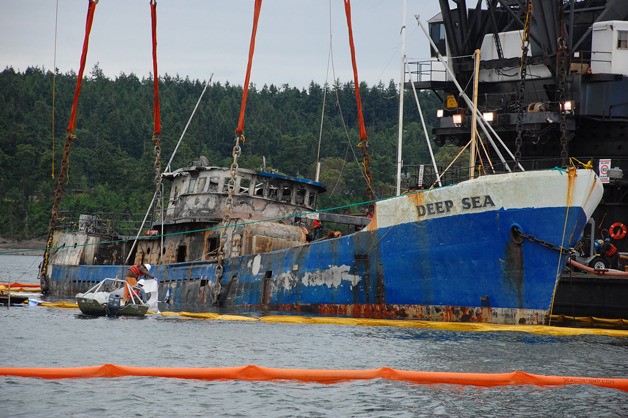Environmental disasters such as the 2012 sinking of the Deep Sea in Penn Cove may soon be a little more avoidable.
The state Legislature approved a bill last week that preserves funding for the state’s derelict vessel program and sharpens the effectiveness of existing laws. The legislation sailed through the House and Senate with hefty majority votes and was forwarded to Gov. Jay Inslee to sign into law.
“It’s nice to know they are making progress and doing something about the problem,” said Ian Jefferds, owner of Penn Cove Shellfish.
The mussel farm, which operates just west of the Coupeville Wharf, was one of those most affected by the sinking of the Deep Sea last year. The 140-foot crab boat caught fire and then went down just outside the farm’s mussel rafts, spilling thousands of gallons of diesel fuel into Penn Cove.
The old boat was illegally moored in the spot for months. State and federal efforts to contain the spill, raise and dispose of the vessel cost taxpayers a whopping $5.4 million.
According to Melissa Ferris, chief of the state Department of Natural Resources’s Derelict Vessel Removal Program, the state is currently aware of about 165 problem vessels.
Special one-time funding helped whittle down the number from more than 200 last year but the list never stops growing, she said.
“We get new ones reported to us two or three times a week,” Ferris said.
This bill is not landmark legislation that will permanently end the threat of old boats sinking and polluting Puget Sound. But it will add a handful of measures that will help state regulators better address the ongoing issue, Ferris said.
“There’s not going to be a night or day difference with the passage of this bill. But in the long run it should leave us with fewer derelict vessels to deal with,” she said.
First and foremost, it retains a $1 registration fee that was set to expire next year. With an existing $2 fee in place, that $1 represents about one-third of the program’s budget.
The new legislation also specifies about $200,000 in funding for a vessel turn-in program. Aimed at smaller recreational vessels, this should reduce the number of boats sold for $1 on Craigslist by owners who can’t afford to sell them properly, Ferris said.
“It would try to get these vessels out of the water while they are still floating,” she said.
Under the bill, state owned boats would need to be inspected before being sold as would vessels over 65 feet in length that are more than 40 years old.
The idea is to help potential buyers know just what they are getting into before they take on a floating hulk they can’t afford to fix up, Ferris said.
Department of Ecology officials would also have the power to get administrative warrants — through the courts — to board and inspect potential problem vessels.
Had that option existed this time last year, much of the environmental impact of the Deep Sea’s sinking may have been avoided.
“It definitely would have gotten someone onboard and gotten the fuel removed,” Ferris said.
Finally, vessel registration violations would be decriminalized. While that may seem like a step backward, officials believe it could lead to greater accountability and oversight.
That will generate additional revenue for other state programs while also helping keep better track of derelict vessel owners should they pass through multiple hands, Ferris said.
According to Ferris, the bill was a bi-partisan effort and widely supported in the House and Senate though she singled out Rep. Norma Smith, R-Clinton, as one of a few who championed the new legislation.
Smith called the legislation a “significant first step” toward “fundamental” change in the way the state addresses derelict vessels. And more change is on the way, she said, as additional legislation will be proposed next year.
It will revamp owner responsibilities, further refine guidelines for public and private vessels before their sale, and revise protocols and regulatory obstacles that make disposing old vessels difficult.
“There is a potential tsunami of really old vessels coming down the pike and we need to have a plan in place now to deal with them,” Smith said. “That’s what this is really all about.”
Many in Coupeville, such as Jefferds, are grateful for the support in Olympia and at home. His company is still feeling the financial and operational sting from the sinking.
When the Deep Sea went down, commercial and recreational shellfish harvesting was closed and an annual seed-set at the farm delayed. Jefferds was able to move the crop to the company’s other farm in Quilcene but he’s been juggling assets and employees for nearly a year to deal with the fiasco.
“We’ll be back in full form here in a few months,” Jefferds said. “It’s just been frustrating because the delay is a direct result of this oil spill.”
He said he has submitted a claim for damages to a federal oil spill fund, but it has yet to be settled. He declined to release the amount sought, saying only that it amounted to “lost business” while operations were shut down.



